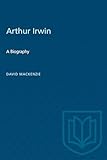Arthur Irwin : A Biography / David MacKenzie.
Material type: TextSeries: HeritagePublisher: Toronto : University of Toronto Press, [1993]Copyright date: ©1993Description: 1 online resource (360 p.)Content type:
TextSeries: HeritagePublisher: Toronto : University of Toronto Press, [1993]Copyright date: ©1993Description: 1 online resource (360 p.)Content type: - 9781487577308
- 9781487576592
- 070.5/1/092 20
- PN4913.I79 M33 1993
- online - DeGruyter
| Item type | Current library | Call number | URL | Status | Notes | Barcode | |
|---|---|---|---|---|---|---|---|
 eBook
eBook
|
Biblioteca "Angelicum" Pont. Univ. S.Tommaso d'Aquino Nuvola online | online - DeGruyter (Browse shelf(Opens below)) | Online access | Not for loan (Accesso limitato) | Accesso per gli utenti autorizzati / Access for authorized users | (dgr)9781487576592 |
restricted access online access with authorization star
http://purl.org/coar/access_right/c_16ec
From 1925 to 1950, Arthur Irwin was the driving force behind the success of Maclean's Magazine, first as an associate editor, then managing editor, and, finally, as an editor. He had strong views on what it meant to be Canadian, and under his direction Maclean's was moulded into 'Canada's National Magazine,' mirroring the development of Canada as an independent nation in the twentieth century. In the years before the outbreak of the Second World War, he was at the centre of the Maclean Company's investigation of the Department of National Defence's system of defence contracting, or what has become known as the 'Bren Gun Scandal.' In the 1940s Irwin actively sought out writers of talent and potential and gradually added to the magazine's staff many Canadian writers who went on to distinguished careers, including Ralph Allen, Pierre Berton, Blair Fraser, and Scott Young. After leaving Maclean's in 1950, Irwin was appointed film commissioner at the National Film Board, during a time when the board's survival was in doubt because of allegations of espionage and subversion. Irwin was the man called in to deal with the NFB's 'red scare,' and, afterwards, he reorganized the board and moved its operations from Ottawa to Montreal. Irwin subsequently went on to a career as a diplomat: he was appointed high commissioner in Australia, and ambassador to Brazil and Mexico. In his last professional position he was publisher of a Victoria newspaper. This book, in describing a man who was profoundly representative of his times, and whose presence in major Canadian institutions was influential, captures the mood of Irwin's period, and raises important questions about the roots of present-day Canadian nationalism and cultural identity.
Mode of access: Internet via World Wide Web.
In English.
Description based on online resource; title from PDF title page (publisher's Web site, viewed 01. Nov 2023)


